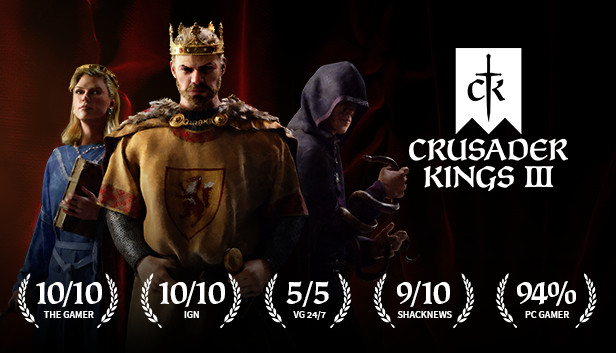Now that you have built your kingdom/empire, how do you ensure it stays together? In Crusader Kings 2, the default would be to change succession to Primogeniture and raise a good heir. Unfortunately we don’t have that luxury in Crusader Kings 3. The Innovation necessary to set that succession law doesn’t even appear until 1200AD and you still need to advance your culture far enough to unlock it.
This guide will go over some basic tips of how to manage your titles upon you current character’s death. Much of it can be difficult to understand at first, but it becomes much more clear once you get the hang of it.
This guide pertains to Partition and Confederate Partition Succession Laws
See our Piety and Prestige Guide here, our Beginner Tips guide here, and our Top 10 Tips for Starting as a Count here.
1. Check the “Title Loss on Succession” tab for heirs you still need to land
This section will essentially be your “homepage” for all things succession related. It will tell you which heirs do not currently have enough land and will begin taking your current Counties away from your primary heir. The worst thing that can happen is to see your entire list of counties going to your random heirs instead of your primary – leaving you with extremely weak military and financial capabilities. Constantly check back to this page to see where your succession is at.
2. Each heir requires a Duchy and a County (typically)
For any ruler that is a Duke or above, the general rule of thumb is that each possible heir will need a duchy and a county to be satisfied. There are exceptions to this rule, but keep this in mind when you are landing your children. The reasoning behind this is that in Partition and Confederate Partition Law, each child receives an “equal” amount of land. If you are Duke or above, you will have a Duchy title that is passed to your eldest son (or child if you have equal laws). Your other children will also want the same to be “equal” and will require a Duchy as well to stay happy.
For Kings and above, you typically will only have one Kingdom to give to your primary heir. The other children will usually still be satisfied with a duchy and county if you land them prior to dying. The more counties and duchies you have, the more lands the children will require to stay satisfied.
In my runs, I typically start off with this general rule of thumb and add more lands as I go to satisfy the other heirs. This method ensures that my primary heir receives the best counties at the heart of the lands that I have spent time and gold developing.
3. Grant newly conquered lands to other heirs
Constantly check back to the “Title Loss on Succession” tab every time you obtain more counties and duchies to pass some titles off. If you are very successful in conquering lands, you will usually end up above the holdings limit and the duchy limit. My default is to just work my way down this list of heirs and grant a duchy and a county to each one until they are no longer there.
These lands will typically be much worse off compared to your original holdings since they are usually a different culture, lower development level, and lower control. Instead of reserving these ones for your primary heir, give them to your other children to satisfy their land requirements.
Giving these lands to your children rather than your vassals also has benefits of keeping the lands within the family. They are easier to call upon in wars and typically have a higher opinion of you.
4. Splintering the realm is not always a bad thing
If you aren’t able to create a Kingdom by the time you finish your first character, you will end up with a splintered realm due to other children being the same rank as your primary heir. This in itself is not a bad thing since the new realms are usually much weaker than the one your primary heir inherits. Your new character also has claims on the old lands that you had and can start a war to get them back.
It is usually a good idea to immediately declare war on your siblings right after you start the new character since their counties are typically weaker at the start. In most of my games, I haven’t encountered many difficulties with this method of gaining land back. However, it is a bit of a pain having to do this each time and it eats up valuable time that could be spent conquering new lands.
Worst case scenario, your splintered realm remains splintered and you now have another independent Duke in your Dynasty. This actually adds more Dynasty prestige according to the current calculations – allowing you to obtain powerful Dynasty perks faster.
5. Counties are the most important titles
If all you have is your single capital County, you likely won’t be able to defend your entire Kingdom/Empire. With how Levies and Taxes work, your Counties are the absolute most important titles in Crusader Kings 3. Your vassals may be able to provide you with these resources, but things can quickly go sideways once they start joining factions. The Faction Strength is based off of a percentage of your own strength and it is infinitely harder to maintain control when you only have 2-3 thousand men at your command.
Prioritize 2-3 highly valuable counties (in addition to the capital) to be passed down to every single character you play. Give away as much as you need to in order to satisfy your other heirs before you die so that these core Counties remain in your direct command.
This will make your life a ton easier when putting down rebels and fighting your other siblings for control. The larger you expand, the more careful you have to be in ensuring that you stay in command of your powerful base of operations.
6. Partition is better than Confederate Partition at preventing realm splintering
In Confederate Partition, if your child has enough land then they will automatically create a higher tier title to match yours. For example, one of my sons can have the Duchy of Brittany and enough lands to create the Kingdom of Brittany. Upon my death he will automatically create that Kingdom and split off from the Kingdom of France under Confederate Partition. In Partition, this would not happen since titles are not automatically created.
Going with Partition instead is almost exactly the same succession law except for not creating new titles. If you are at a Kingdom level, then it is worth considering changing the law to avoid having another Kingdom to deal with. Like mentioned in Tip #4, it isn’t always a bad thing but it can get tiresome having to constantly fight after each inheritance.
The downside to this is if you do not have enough Gold to create a Duchy title and you are only a Duke, your heir will take the County and remain a vassal. This can be a big problem since you can’t just go to war with them as in Tip #4, and you end up losing that County for good. Make sure to avoid this by either rushing to the Kingdom stage or by managing your Gold properly to ensure titles are granted appropriately before your death.
7. Send your other sons to War as Knights
Unethical and very disturbing, but you can get rid of your other unwanted heirs by “Forcing” the Knight status and sending a small group of them to fight a much larger enemy. Crusader Kings 3 is ruthless at killing off Knights with poor Prowess and your sons are no different. You also don’t get any penalties from this method other than increasing stress due to your children dying.
The biggest downside to this method is that you are placing all of your eggs in one basket. If your primary heir dies, it is game over for you. If you ever want to consider doing this, then make sure to “Forbid” your primary heir from being a Knight.
8. Avoid Disinheriting, Murdering or Imprisoning your other heirs
The penalty for Disinheriting is far too high for this to be a manageable method of controlling succession. You lose a ton of prestige each time you do it and if you have 5-6 viable heirs you will be in a huge amount of prestige trouble.
If you have the sadistic trait, the intrigue option of “Murder” then becomes available to use on your children. However, if you get found out then the Kinslayer penalty for most cultures can be fairly harsh. Repeat this process for another 4-5 other children and it quickly becomes an issue. Like mentioned above in Tip #7, having your children die is a very risky choice since it can quickly result in a game over if your primary heir dies.
Imprisoning and executing is another method to remove heirs from your dynasty. This incurs a huge amount of tyranny to accomplish for anything more than 1-2 heirs. Like above, this runs into issues of being a Kinslayer and increases the potential risk of a game over.
9. Grant Titles to the heir of your heir
If there are no other ways to resolve your current succession issues, granting titles to the heir of your heir enables you to use those Counties at a later point in the game. You can’t grant everything to your son due to the succession law, but it still works for your grandson. One other benefit to this is if your grandson dies, typically the titles transfer back to either you or your heir according to their succession law.
Keep in mind that this method is typically a last-resort since the Counties you are granting are far more useful if they are directly controlled by you. Only do this if you know your character is about to die and no other tip on this list is going to work.
10. Make sure your son’s marriage type is NOT matrilineal
This is a little bit off-topic, but it should still be mentioned in case any new players are reading this. All of the marriages you arrange for your sons should NOT have the matrilineal option ticked since that means any of their children will be of a different dynasty. It is usually safest to arrange for a marriage even when they are children to secure alliances and to ensure that the children still belong to your dynasty. Once they are adults they can marry other people on their own unless you restrict their marriage freedom.
Conclusion
Succession laws are vastly different in Crusader Kings 3 than they are in Crusader Kings 2. It is one of the biggest adjustments to make, but once you get used to it the story of your characters become much more interesting. I hope that this guide has helped you with organizing your realm and ensuring your lands stay strong!
Thank you all for reading and happy conquering 🙂
See our Piety and Prestige Guide here, our Beginner Tips guide here, and our Top 10 Tips for Starting as a Count here.
Please follow me on Twitter here and on Facebook here for more updates on our reviews and beginner guides!





Pingback: Crusader Kings 3 Prestige and Piety Guide - Kijin Gaming
Pingback: Crusader Kings 3 Beginner Tips - Kijin Gaming
Pingback: Crusader Kings 3 Top 10 Tips for Starting as a Count - KijinGaming
Pingback: Crusader Kings 3: How to Play Tall Guide and Tips - KijinGaming